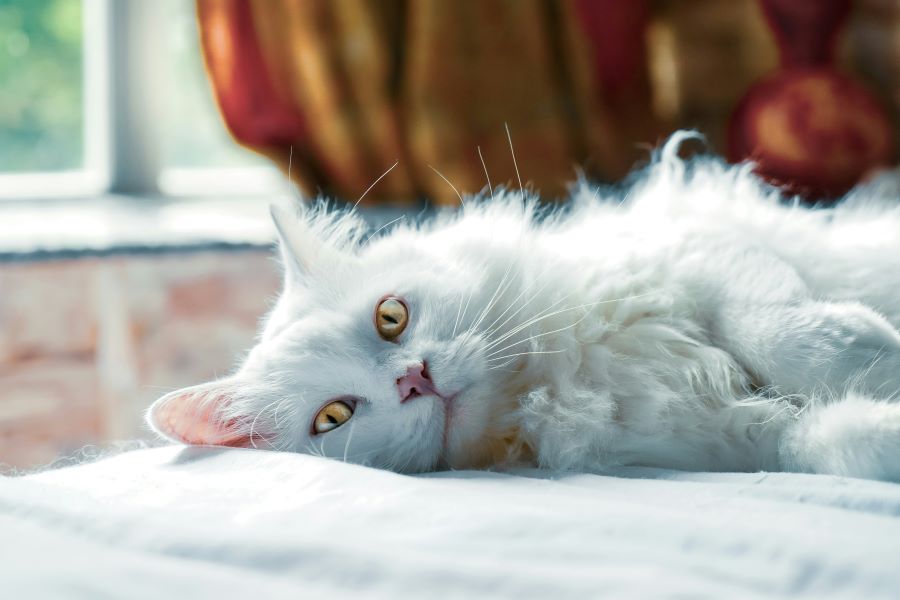
Natural Cat Litter for Odor Control: A Sustainable and Green Choice
LifeSong StaffImagine a world where the simple choices we make for our pets ripple out to create a positive impact on the environment, our homes, and the ones we love. Natural cat litter is more than just a pet care product—it's a step towards a harmonious life where we honor the Earth and our feline companions. As cat lovers, we seek a balance between comfort, cleanliness, and conscience. Natural cat litter, with its promise of effective odor control and eco-friendliness, embodies this balance beautifully.
What is Natural Cat Litter?
Natural cat litter is made from organic and biodegradable materials such as wood, corn, wheat, paper, walnut shells, or coconut husks. Unlike traditional clay litters, which are sourced through environmentally harmful strip mining, natural litters are often derived from sustainable resources. This type of litter breaks down more easily in the environment and can often be composted, making it a greener choice for eco-conscious pet owners.
Types of Natural Cat Litter
- Wood-Based Litter: Made from pine, cedar, or other wood sources, this type of litter is known for its natural scent and excellent odor control. Pine pellets and sawdust are common forms, which naturally neutralize odors due to the inherent properties of the wood.
- Corn-Based Litter: Ground corn kernels are used to create this highly absorbent litter. Corn litter is effective at clumping and controlling odor due to its natural starch content, which binds moisture and odors efficiently.
- Wheat-Based Litter: Wheat litter combines the natural enzymes in wheat with its absorptive capacity to trap odors and moisture. It clumps well and is biodegradable.
- Paper-Based Litter: Recycled paper, often in pellet or granule form, offers a dust-free and biodegradable option. Paper litter absorbs moisture and odors effectively, though it may require more frequent changes compared to other natural litters.
- Walnut Shell-Based Litter: Ground walnut shells provide a highly absorbent and odor-neutralizing litter. This option is lightweight and offers good clumping abilities, making it easy to scoop.
- Coconut Husk Litter: Made from the fibrous husks of coconuts, this litter is biodegradable and controls odors well due to its high absorptive capacity.
Advantages of Natural Cat Litter for Odor Control
- Effective Odor Neutralization: Natural cat litters are inherently good at controlling odors due to the natural properties of the materials used. For instance, pine contains natural oils that counteract ammonia smells, while corn and wheat enzymes break down odor-causing compounds.
- Low Dust Levels: Many natural litters produce little to no dust, which not only benefits cats with respiratory issues but also reduces the spread of litter dust around the home. This is a significant advantage over traditional clay litters, which can create dust clouds that carry odors.
- Biodegradable and Compostable: Natural cat litters are typically biodegradable, making them an eco-friendly choice. Some types can even be composted, reducing landfill waste and contributing to a more sustainable lifestyle.
- Non-Toxic: Free from chemicals and additives, natural cat litters are safe for cats, even if ingested. This is particularly important for kittens and cats that may chew on or ingest litter.
- Renewable Resources: Unlike clay, which is mined and non-renewable, the materials used for natural litters are renewable and often by-products of other industries (such as agriculture), reducing environmental impact.
Practical Considerations
- Transition Period: Cats accustomed to traditional litter may need time to adjust to a new texture or scent. Gradually mixing natural litter with the old type can ease this transition.
- Cost: Natural litters can be more expensive than traditional options. However, their effectiveness in odor control and environmental benefits may justify the cost for many cat owners.
- Availability: While becoming more common, natural litters may not be as widely available as traditional clay litters, particularly in certain regions. However, online retailers offer a broad selection, often with subscription options for convenience.
- Clumping Ability: Not all natural litters clump as well as traditional clumping clay litter. Users may need to try different brands or types to find the one that balances clumping ability with odor control effectively.
- Maintenance: Some natural litters may require more frequent changes to maintain optimal odor control, especially paper-based types. Regular scooping and litter box maintenance are essential for all types of litter to manage odor effectively.
Popular Brands of Natural Cat Litter
- World’s Best Cat Litter: Made from corn, this litter is known for its strong clumping and excellent odor control. It’s flushable and biodegradable.
- Feline Pine: A popular wood-based litter that offers a fresh pine scent and good odor neutralization due to its natural oils.
- Okocat: Made from reclaimed wood, Okocat is known for its low dust, clumping capabilities, and odor control.
- Yesterday’s News: A paper-based litter from recycled paper, offering a dust-free and gentle option for cats with sensitivities.
- sWheat Scoop: A wheat-based litter that combines natural enzymes with wheat starch to provide effective clumping and odor control.
Environmental Impact
The environmental benefits of natural cat litter extend beyond odor control. By choosing natural litter, cat owners contribute to reducing the environmental footprint of their pets. Traditional clay litter involves strip mining, which destroys landscapes and habitats, while natural litter materials are often by-products of renewable resources. Furthermore, because natural litters are biodegradable, they break down more easily in landfills or compost heaps, reducing the long-term impact on waste management systems.
Conclusion
Natural cat litter presents a compelling alternative to traditional clay and silica-based products, offering effective odor control through eco-friendly, biodegradable materials. While the initial cost may be higher, the benefits in terms of environmental sustainability, health safety, and reduced dust make natural cat litter a worthwhile consideration for conscientious pet owners. As the market for natural cat litter continues to grow, it becomes increasingly accessible, providing more options for cat owners to make choices that align with their values while ensuring a fresh and odor-free environment for their homes. So, let’s make the switch, embrace the change, and celebrate the joy of living in harmony with nature, one litter box at a time.
